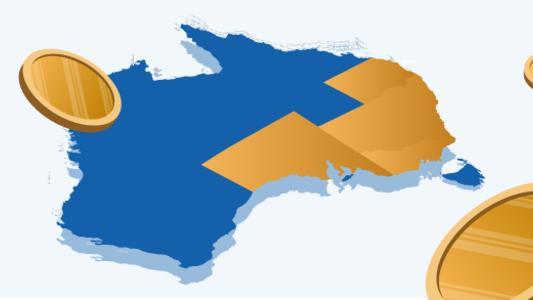High Wholesale Electricity Prices Explained
The Australian energy market is going through a crisis of the likes we haven't seen almost ever before. This has caused energy prices to skyrocket, energy companies to close or recommend their customers to find another supplier, and consumers left out of pocket with rising energy bills and the cost of living over the coming months and years.
Why Are Energy Prices Getting So High?
As we mentioned above, a perfect storm of situations has caused energy prices to skyrocket in Australia causing consumer electricity bills to also rise.
Here's a quick look at what has caused energy prices to be so high in Australia:
- Russia's war with Ukraine has caused a global gas and energy shortage. (Gas is sometimes used to create electricity in gas-powered electricity plants)
- Australia exports 85% of its gas, and with the world shortage, international prices are rising and therefore, prices at home are rising as well.
- Cold fronts across Australia have also cost a rise in demand for electricity and gas as people rush to keep their homes.
- Australia is heavily reliant on coal-powered electricity plants. However, around 25% of Australia's coal generation is currently out of service due to a range of unforeseen and planned circumstances.
Russia's War in Ukraine
Russia is one of the world's major gas producers, and since its invasion of Ukraine, Europe and other nations around the world are distancing themselves from Russian-supplied gas. The European Union is working to phase out Russian gas completely. This means that the large demand for Russian gas filled globally must now be supplied by other gas-producing countries.
Australia is a gas-producing country, so we are being called on export gas, but are also in need of it at home. This high demand and low supply cause the price to rise. Another important aspect is that electricity prices are partly determined by the price of gas. This has led to wholesale energy prices rising by a dramatic 141% and in Victoria rising 80x the normal wholesale price .
Issues With Australian Energy Supplies

Apart from the Russian war, there've also been several problems with Australia's energy supply chain. As we mentioned, Australia is heavily reliant on gas and coal to produce electricity, and also to burn for heat. It just so happened that nearly 30% of coal-fired power plants are out of service due to unplanned breakdowns and planned repairs.
Many of these plants are very old and have been set to be phased out or are in the process of closing
This means that even if we wanted to increase production, the situation is quite difficult. 60% of the east coast of Australia relies on energy directly produced by coal.
Origin energy recently mentioned in a statement that it was having trouble sourcing enough coal two power its Eraring power station at full capacity.
Renewable energy is still and its fledgling stages in Australia thanks to the previous government's lack of investment in renewable energy infrastructure.
Wholesale Electricity Prices
Energy companies don't always produce their own electricity. Instead, they buy it from the wholesale market and resell it to customers.
However, wholesale electricity prices are partly determined by the price of gas. This has led to wholesale energy prices to rise by a dramatic 141%.

With wholesale electricity prices rising, many energy companies are no longer able to make a profit on the energy that they sell to customers. 30 to 40% of your energy bills are typically dictated by the price of wholesale electricity.
Are you starting to see how this is a perfect storm?
Weather
Speaking of storms, the rising energy shortages and prices have coincided with the Australian Winter.
The situation would likely be different if we were in a different season. However, people across the nation are now turning on their heating to stay warm. Winter has also coincided with especially cold fronts all across the nation.
With the low supply of energy and everyone using more of it, prices are skyrocketing.
What is the impact of the current energy crisis?
The effects of the energy crisis are:
- Long-term energy price rises
- Energy companies closing
- Cost of living increasing
1. Long-term Energy Price Rise
It's been confirmed that we are expected to see a long-term energy price rise across the country.
The Australian Energy Regulator (AER) said in a statement that prices will remain high for the next two years.
As a result, a new default market offer increase was announced starting July 1st for customers within NEM, and Victoria's Essential Services Commission also announced an increase in the state's energy prices.
Here is how much prices are expected to rise in each state:
- New South Wales: 8.5% - 18.3% increase
- Victoria: 5% increase
- Queensland: 12.6% increase
- South Australia: 9.5% increase
2. Energy Companies Closing
As we mentioned before, many energy companies are feeling the strain the rising wholesale cost of electricity is putting on their businesses.
Many customers have fixed rate plans which means that you negotiate a price with the energy provider for a year-long contract. The energy provider guarantees that they will match that price for a year.
What is happening now is that energy companies are purchasing electricity for more than they are able to sell it, meaning they're starting to lose money.
Larger companies such as AGL and Origin Energy are going to be able to take the hit for a longer period of time as they have been profitable energy companies for years on end with an enormous amount of customers. However, this is a huge strain for smaller companies.
3. Cost of Living Increasing
The energy crisis affects me way more players than you first may guess.
First of all, energy is something that everybody uses. This is true for factories, farms, schools, businesses, homes etc.
What that means is that if the electricity cost affects day-to-day business costs, consumers can also expect prices to go up everywhere, not just on their energy bills.
How to Lower Your Energy Bill
The question of the hour is: How can I lower my energy bills?
Here's a list of our suggestions for saving money on your energy this winter:

- Call your energy provider and see what they can do to assist you
- Consider switching energy providers to a fixed rate plan
- Use less energy at home
- Bundle your bill to save
- Reduce costs elsewhere
1. Speak to Your Energy Provider
It's important to call and speak to your energy provider so you can know what the current situation is with your specific energy company. This will help you know if it's worth taking a look at other offers from different companies. Make sure you check for exit fees and disconnection fees on your contract.
2. Switch Energy Providers
Many energy providers are moving to variable rates to deal with the current crisis. However, there are still some good offers available.
We recommend comparing energy providers to see if it's worth switching companies.
If you can lock in a fixed rate, you can maintain the same price for another year which will allow you to plan for a rise in prices next year.
Energy Bills are Rising All Across Australia! - Are You Prepared?
Get a Fixed Rate Plan Now and Save!
3. Use Less Energy at Home
While this may sound cliché, using less energy at home can save you tons of money on energy bills.
Here are our tips to use less energy at home:
- Unplug the unused devices. They consume energy even when they're off.
- Switch to energy-efficient appliances. One LED lightbulb saves around $35 worth of electricity versus incandescent light bulbs. You can find cheap LED bulbs online sent from China for a very affordable price.
- Upgrade your appliances. Older appliances tend to use more energy than newer ones. It's worth checking to see if the cost of a new appliance is less than the extra money you spend using your current appliance over the next few years.
- Heat one room out of time. Don't waste energy by heating rooms that you aren't using. A small heater can heat a bedroom in 20-30 minutes.
- Using the electric blanket instead of heating. Heating the air is very inefficient, heat your body instead.
- Turn down the temperature on your water heater. If you have a tank, it's always on and heating its contents to the temperature you set.
- Take advantage of electricity prices at off-peak hours.
- Turn off your lights or use only one light when you're in a room.
- Consider Center link assistance payments and energy rebates.
4. Bundle Your Bills
Companies like SUMO offer electricity, gas and internet plans. By opting for bundles you can save. The same goes for telecom companies like Telstra that offer NBN, phone plans, streaming services, and more.
5. Reduce Costs Elsewhere
This is the last resort and one of our last tips for saving money this winter. While it's not directly related to the cost of your energy, it can help offset the energy price rise.
Look for areas in your life where you may be spending extra.
Ask yourself the following questions:
- What am I paying for that I don't need?
- What items can I live without?
- Do I use my gym membership?
- Do I need Netflix?
- Can I drink at home and save on drinks going out?
- Can I switch to a cheaper plan on my insurance?
- Could I refinance my home and get better rates than before?
- Can I barter for anything?
All of these questions can help you when it comes to deciding where to cut costs.
However, the best way to save money is to compare energy suppliers. Learn how to switch by reading our guide to switching energy suppliers, or by calling us for free advice.
Frequently Asked Questions
Why are energy prices rising in Australia?
Energy prices are rising due to a mix of factors including global supply shortages caused by the Russia-Ukraine conflict, increased demand from colder weather, a high reliance on aging coal power plants with many offline, and limited investment in renewables and grid infrastructure.
How does the global gas market impact Australian energy prices?
Australia exports a large portion of its gas resources, and global shortages and high international prices drive up local gas costs. Since gas prices influence electricity prices via gas-powered plants, this raises overall energy costs for consumers.
What are the consequences of the current energy crisis?
The crisis leads to soaring electricity bills, increased cost of living, uncertainty in the energy market, and some energy companies ceasing operations or limiting customer services due to unsustainable costs.
Are energy prices expected to stay high?
Yes, prices are projected to remain elevated for at least the next two years due to ongoing supply issues, infrastructure challenges, and geopolitical events affecting fuel costs.
What can consumers do to manage rising energy costs?
Consumers can reduce consumption by adopting energy-efficient habits and appliances, switch to fixed-rate plans or better providers, take advantage of rebates and assistance programs, and explore options like solar energy and battery storage.
Why are some energy companies closing?
Some smaller energy companies face unsustainable costs as wholesale energy prices rise faster than they can charge customers, leading to closures or recommendations for customers to switch providers.
More about Market
More about Market

Controlled Load Tariffs Explained

The Electricity Reference Price & Default Market Offer 2025

What is LPG? Gas Bottle Sizes, Prices & Uses

What Happens If Your Energy Company Goes Out of Business?

Energy & Water Ombudsman Australia | Ombudsman in Your State

How Smart Meters Work - Is a Smart Meter Worth It?

Tariff Guide 2025 - Peak & Off-Peak Electricity Times

Senior Energy Rebates Australia | State-by-State Guide 2025
Click below to find a better deal for your home!
